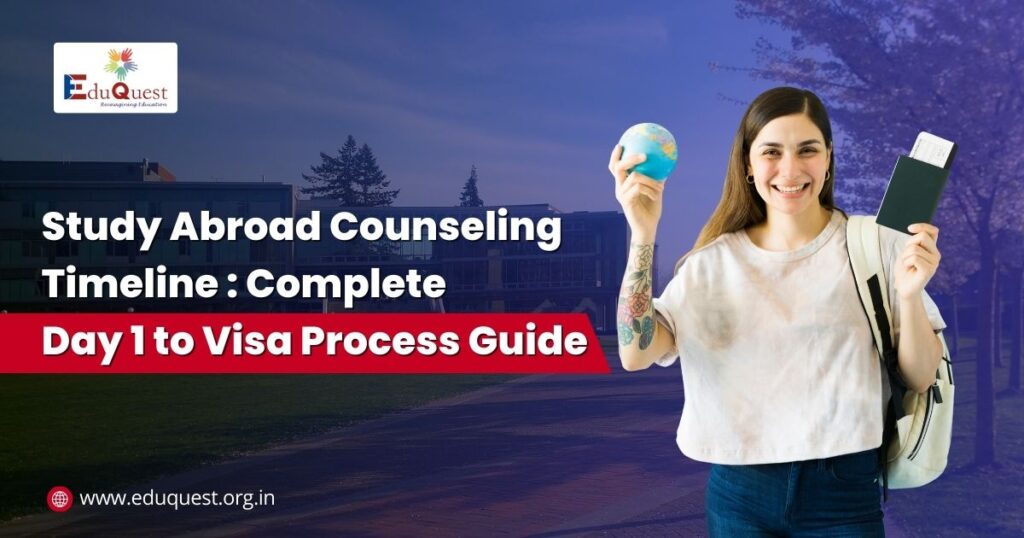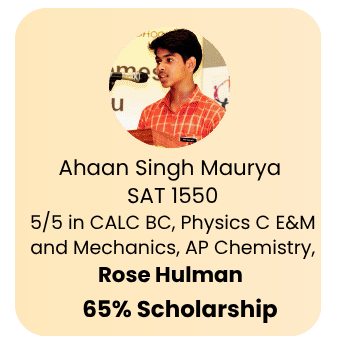Priya Sharma stared at her calendar in panic. It was October of her Class 12 year, and she had just realized that US university applications were due in three months. Her friends had started their study abroad counseling process 18 months earlier, while she was still deciding between engineering and business. Now, with SAT scores to improve, essays to write, and applications to complete, the timeline seemed impossible.
This scenario plays out in thousands of Indian households every year. Students and parents underestimate the complexity and duration of the overseas education guidance process, leading to rushed applications, missed opportunities, and suboptimal outcomes. The difference between starting early with proper planning and scrambling at the last minute can determine whether your child gets into their dream university or settles for backup options.
After analyzing successful study abroad planning timelines from over 500 students who gained admission to top international universities, we’ve created the definitive roadmap that takes you from initial consultation to visa approval. This comprehensive timeline has helped families avoid costly mistakes, optimize their preparation time, and achieve results that seemed impossible with traditional last-minute approaches.
The international education services process isn’t just about filling out applications – it’s a strategic, multi-phase journey that requires careful coordination of test preparation, profile building, application development, and visa processing. Understanding this timeline empowers you to start early, plan effectively, and maximize your child’s chances of international education success.
Whether you’re a Class 10 student beginning early preparation or a Class 12 student working within tighter constraints, this timeline provides the framework for achieving your international education goals systematically and successfully.
Phase 1: Foundation and Assessment (Months 18-16 Before University Start)
Month 18: Initial Consultation and Goal Setting
Week 1-2: Comprehensive Profile Assessment
Your study abroad consultant journey begins with a thorough evaluation of your child’s current academic standing, interests, and long-term goals. This isn’t a casual conversation – it’s a systematic assessment that forms the foundation for all subsequent decisions.
Key Activities:
- Academic transcript analysis with GPA calculations for different international systems
- Standardized test diagnostic assessment (SAT, ACT, AP) to establish baseline scores
- Extracurricular activity audit identifying strengths and gaps
- Career interest exploration through aptitude tests and counseling sessions
- Family financial planning discussion including budget constraints and scholarship needs
- Cultural preference assessment for different study destinations
Deliverables:
- Comprehensive Student Profile Report (8-12 pages)
- SWOT Analysis highlighting strengths, weaknesses, opportunities, and threats
- Preliminary country and course recommendations
- 18-month strategic timeline with major milestones
Success Metrics: Clear understanding of student’s current position and realistic goal-setting based on profile strengths and improvement potential .
Week 3-4: Strategic Planning and Timeline Development
Based on the initial assessment, your consultant develops a personalized roadmap that aligns with your child’s goals while accounting for their current profile and available preparation time.
Strategic Decisions:
- Target country selection (USA, UK, Canada, Australia, Germany, Singapore)
- Course and major identification aligned with career goals
- University tier targeting (Ivy League, Russell Group, Group of Eight, etc.)
- Test preparation strategy (SAT vs ACT, IELTS vs TOEFL)
- Profile enhancement priorities and timeline
- Financial planning and scholarship strategy development
Family Alignment: Ensuring all family members understand the commitment required and agree on goals, timeline, and investment levels.
Month 17: Test Preparation Foundation
Week 1-2: Diagnostic Testing and Strategy Development
Professional study abroad services begin with comprehensive diagnostic testing to identify specific strengths and weaknesses across all test sections.
Testing Components:
- Full-length SAT or ACT diagnostic under timed conditions
- Section-specific analysis identifying improvement priorities
- English proficiency assessment (IELTS/TOEFL diagnostic)
- Subject-specific testing for AP or A-level requirements
- Learning style assessment to customize teaching approaches
- Test anxiety evaluation and management strategy development
Study Plan Creation:
- Customized study schedule based on school commitments and other activities
- Weekly practice test calendar with performance tracking
- Resource allocation including books, online platforms, and tutoring
- Milestone setting with monthly score improvement targets
- Backup timeline planning in case initial goals aren’t met
Week 3-4: Academic Foundation Strengthening
While test preparation begins, parallel focus on strengthening core academic performance ensures strong transcripts for university applications.
Academic Optimization:
- Current grade analysis and improvement strategies
- Subject selection optimization for Class 11 and 12
- Advanced course planning (AP, IB, or equivalent)
- Teacher relationship building for future recommendation letters
- Academic competition identification and participation planning
Month 16: Profile Building Strategy Implementation
Week 1-2: Extracurricular Activity Planning
International student advisors help identify meaningful activities that align with your child’s interests while building a competitive profile for target universities.
Activity Categories:
- Leadership opportunities in school or community organizations
- Research projects aligned with academic interests
- Community service with measurable impact
- Internship and work experience planning
- Competition participation in academic or extracurricular areas
- Creative pursuits demonstrating passion and commitment
Quality Over Quantity: Focus on 3-4 meaningful activities with significant involvement rather than numerous superficial participations .
Week 3-4: Summer Planning and Opportunity Identification
Strategic summer planning maximizes profile-building opportunities during school breaks.
Summer Opportunities:
- Research internships at universities or organizations
- Leadership programs and summer schools
- International exposure through exchanges or travel programs
- Skill development courses aligned with career interests
- Community service projects with lasting impact
- Academic enrichment programs in target subjects
Phase 2: Intensive Preparation and Development (Months 15-10)
Months 15-13: Test Preparation Intensification
Month 15: Foundation Building
Week 1-4: Core Concept Mastery
- Intensive instruction in weak subject areas identified through diagnostics
- Strategy development for different question types and sections
- Time management technique implementation
- Regular practice testing with detailed performance analysis
- Concept reinforcement through varied practice materials
- Progress tracking with monthly milestone assessments
Study Schedule Optimization: Balancing test preparation with school commitments and extracurricular activities without overwhelming the student .
Month 14: Strategy Refinement
Week 1-2: Advanced Technique Implementation
- Section-specific strategy refinement based on practice test performance
- Advanced problem-solving techniques for challenging questions
- Elimination strategies for multiple-choice sections
- Essay writing skill development for applicable tests
- Calculator and non-calculator strategy optimization for math sections
Week 3-4: Performance Optimization
- Full-length practice tests under realistic conditions
- Detailed error analysis and correction strategies
- Timing optimization for each section
- Test day simulation including breaks and materials
- Stress management and anxiety reduction techniques
Month 13: Pre-Test Preparation
Week 1-2: Final Preparation Phase
- Last-minute review of challenging concepts
- Test registration and logistics confirmation
- Test center familiarization and route planning
- Final practice tests focusing on timing and endurance
- Mental preparation and confidence building
Week 3-4: First Official Test Attempt
- Official SAT/ACT test administration
- Post-test analysis and score evaluation
- Retake decision based on target university requirements
- Score reporting strategy for university applications
- Celebration of achievements and learning from areas for improvement
Months 12-10: Profile Enhancement and University Research
Month 12: Extracurricular Development
Week 1-2: Leadership Initiative Launch Students begin taking on significant leadership roles in chosen activities, demonstrating growth and impact over time.
Leadership Development:
- Student government or club officer positions
- Community organization volunteer leadership
- Peer tutoring or mentoring program development
- Social impact project initiation and management
- Academic team captain or competition leadership roles
Week 3-4: Research and Academic Enrichment
- University research program applications and participation
- Independent research project development in areas of interest
- Academic competition preparation and participation
- Advanced coursework selection for upcoming academic year
- Teacher and mentor relationship building for recommendation letters
Month 11: University Research and Selection
Week 1-2: Comprehensive University Research Your education consultancy firm provides detailed analysis of universities that match your child’s profile and goals.
Research Components:
- Academic program analysis for target majors
- Admission requirement comparison across universities
- Campus culture and student life evaluation
- Location and climate consideration
- Cost analysis including tuition, living expenses, and financial aid
- Alumni network and career outcome research
Week 3-4: Preliminary University List Development
- Reach, match, and safety school categorization
- Application requirement compilation for each university
- Scholarship opportunity identification and analysis
- Application deadline calendar creation
- Early decision vs regular decision strategy development
Month 10: Application Strategy Finalization
Week 1-2: Final University List Confirmation Based on updated test scores and profile development, finalize the university application list with strategic consideration of admission probabilities and family preferences.
Strategic Considerations:
- Updated admission probability calculations based on current profile
- Application workload management across different universities
- Scholarship potential assessment for each institution
- Geographic and cultural fit evaluation
- Financial aid and merit scholarship opportunities
Week 3-4: Application Timeline and Resource Planning
- Detailed application calendar with all deadlines and requirements
- Essay prompt analysis and strategic response planning
- Recommendation letter timeline and coordinator identification
- Document preparation schedule including transcripts and certificates
- Financial planning for application fees and related expenses
Phase 3: Application Development and Submission (Months 9-4)
Months 9-7: Essay and Application Component Development
Month 9: Essay Development Phase 1
Week 1-2: Brainstorming and Story Development Professional college application consultants guide students through discovering their unique stories and experiences that will differentiate their applications.
Brainstorming Process:
- Personal experience inventory and significance analysis
- Challenge and growth story identification
- Passion and interest exploration with specific examples
- Value system and belief examination
- Future goal articulation with concrete plans
- Unique perspective and background highlighting
Week 3-4: Essay Planning and Outline Development
- University-specific prompt analysis and strategic response planning
- Essay outline creation with compelling narrative arcs
- Theme consistency verification across all application components
- Word count optimization and content prioritization
- Authenticity verification ensuring genuine student voice
Month 8: Essay Development Phase 2
Week 1-2: First Draft Creation Students write initial essay drafts with consultant guidance, focusing on authentic expression and compelling storytelling.
Writing Process:
- Personal statement first draft completion
- Supplemental essay drafts for each university
- Short answer response development
- Creative writing samples for applicable programs
- Why this university essays with specific research and reasoning
Week 3-4: Review and Revision Cycle 1
- Comprehensive essay review with detailed feedback
- Content development suggestions and narrative strengthening
- Grammar, style, and clarity improvements
- University-specific customization and optimization
- Authenticity verification and voice consistency checking
Month 7: Essay Finalization and Application Component Completion
Week 1-2: Final Essay Revisions
- Implementation of feedback from previous revision cycles
- Final proofreading and error elimination
- University-specific customization completion
- Word count optimization and content refinement
- Peer and family review incorporation where appropriate
Week 3-4: Application Form Completion
- Comprehensive application form completion with strategic information presentation
- Activity list optimization with impact quantification
- Academic information verification and presentation
- Personal information consistency across all applications
- Technical submission preparation and testing
Months 6-4: Application Submission and Follow-up
Month 6: Application Finalization
Week 1-2: Final Application Review Comprehensive review of all application components ensures accuracy, completeness, and strategic positioning.
Review Components:
- Application form accuracy and completeness verification
- Essay consistency and quality final check
- Recommendation letter coordination and submission confirmation
- Transcript and document submission verification
- Test score reporting confirmation to all universities
- Application fee payment and confirmation
Week 3-4: Early Decision/Action Submissions
- Strategic early application submissions for maximum advantage
- Deadline adherence with buffer time for technical issues
- Submission confirmation and tracking number documentation
- Follow-up communication with universities as needed
- Backup plan activation if technical difficulties arise
Month 5: Regular Decision Applications and Scholarship Focus
Week 1-2: Regular Decision Application Submissions
- Remaining university applications completion and submission
- Application tracking and confirmation across all institutions
- Missing document identification and rapid submission
- University communication monitoring and response
- Application status tracking system implementation
Week 3-4: Scholarship Application Intensive
- Merit-based scholarship application completion and submission
- Need-based financial aid form completion (FAFSA, CSS Profile)
- External scholarship identification and application
- Scholarship essay development and submission
- Financial aid document preparation and submission
Month 4: Application Monitoring and Interview Preparation
Week 1-2: Application Status Monitoring
- Regular application status checking and issue identification
- Missing document rapid submission and follow-up
- University communication monitoring and appropriate response
- Interview invitation tracking and scheduling
- Waitlist strategy development for competitive programs
Week 3-4: Interview Preparation For universities requiring interviews, comprehensive preparation ensures confident, compelling presentations.
Interview Preparation:
- Mock interview sessions with experienced counselors
- Question bank preparation covering all likely topics
- Personal story articulation and practice
- University-specific research and question development
- Professional presentation and communication skill development
Phase 4: Decision Management and Visa Processing (Months 3-0)
Months 3-1: Admission Decision Management
Month 3: Early Decision Results and Strategy Adjustment
Week 1-2: Early Decision Outcome Processing
- Early decision result analysis and celebration or consolation
- Regular decision strategy adjustment based on early outcomes
- Additional application consideration if early results are disappointing
- Financial aid evaluation and family decision-making support
- Emotional support and motivation maintenance for ongoing applications
Week 3-4: Regular Decision Preparation
- Continued focus on regular decision applications and deadlines
- Scholarship application follow-up and additional opportunity identification
- Academic performance maintenance and final semester planning
- Extracurricular activity continuation and leadership development
- Interview scheduling and preparation for remaining universities
Month 2: Final Application Push and Preparation
Week 1-2: Last-Minute Application Optimization
- Final application submissions for remaining deadlines
- Scholarship deadline adherence and application completion
- Academic update submission to universities where appropriate
- Continued extracurricular excellence and documentation
- University communication and relationship maintenance
Week 3-4: Decision Preparation and Planning
- Decision-making framework development for multiple acceptances
- Financial aid comparison methodology establishment
- Campus visit planning for top choice universities (if possible)
- Backup plan development for various outcome scenarios
- Family discussion facilitation for final decision-making
Month 1: Decision Reception and University Selection
Week 1-2: Admission Decision Analysis
- Comprehensive analysis of all admission decisions and financial aid offers
- Cost-benefit analysis for each acceptance option
- Academic program comparison and fit evaluation
- Career outcome research and alumni network assessment
- Cultural and personal fit consideration for final decision-making
Week 3-4: Final University Selection
- Family decision-making process with consultant guidance
- University acceptance confirmation and deposit submission
- Declined offer communication with appropriate gratitude
- Waitlist strategy implementation for preferred universities if applicable
- Celebration of achievements and acknowledgment of hard work
Month 0: Visa Processing and Pre-Departure Preparation
Week 1-2: Visa Application Preparation
Document Compilation:
- I-20 or equivalent university admission document receipt and verification
- Financial documentation preparation including bank statements and affidavits
- Academic transcript and certificate authentication
- Passport verification and renewal if necessary
- Medical examination scheduling and completion
- Visa application form completion with accuracy verification
Week 3-4: Visa Interview Preparation and Submission
- Visa interview appointment scheduling at appropriate consulate
- Mock interview sessions with visa-specific question preparation
- Document organization and presentation preparation
- Interview day logistics planning and backup preparation
- Visa application submission and tracking number documentation
Pre-Departure Planning:
- Accommodation arrangement and confirmation
- Flight booking and travel planning
- Banking and financial setup for international transactions
- Health insurance and medical preparation
- Cultural orientation and academic expectation setting
- Farewell planning and emotional preparation for departure
Timeline Variations by Country and Program
United States Applications
Key Differences:
- Early Decision deadlines typically November 1st
- Regular Decision deadlines typically January 1st
- SAT/ACT score submission requirements
- Common Application platform usage
- Financial aid form complexity (FAFSA, CSS Profile)
Critical Timeline Adjustments:
- Test preparation should begin 18+ months before application deadlines
- Essay development requires 3-4 months for quality development
- Recommendation letter requests should be made 6+ months in advance
- Financial aid applications require parallel processing with admissions
United Kingdom Applications
UCAS System Specifics:
- Single application deadline (typically January 15th)
- Personal statement replaces multiple essays
- Predicted grade requirements
- Earlier application deadlines for Oxford, Cambridge, and medical programs
- Different academic year start (September/October)
Timeline Modifications:
- A-level or equivalent preparation focus
- Personal statement development over 2-3 months
- Reference letter coordination through school systems
- Earlier decision-making due to different academic calendar
Canada Applications
Provincial Variations:
- Different application systems for different provinces
- Rolling admission processes for many universities
- Multiple intake periods (September, January, May)
- Different standardized test requirements
Flexible Timeline Benefits:
- Multiple application opportunities throughout the year
- Later application deadlines for many programs
- Flexible test score submission requirements
- Multiple start date options for admitted students
Common Timeline Mistakes and How to Avoid Them
Critical Timing Errors
Starting Too Late: The most common mistake is beginning the process in Class 12 when optimal preparation requires 18-24 months. Late starters face:
- Insufficient time for meaningful test score improvement
- Rushed application development with lower quality outcomes
- Limited profile building opportunities
- Higher stress levels and family tension
- Reduced scholarship and financial aid opportunities
Underestimating Component Timelines: Families often underestimate how long each component takes:
- Test preparation: 6-12 months for significant improvement
- Essay development: 3-4 months for authentic, compelling narratives
- Profile building: 12-18 months for meaningful impact demonstration
- Recommendation letter development: 6+ months for strong endorsements
Poor Deadline Management:
- Missing early decision deadlines that offer admission advantages
- Submitting applications at the last minute without adequate review
- Failing to account for time zone differences and technical difficulties
- Not building buffer time for unexpected complications
Timeline Optimization Strategies
Early Start Advantages: Beginning in Class 10 or early Class 11 provides:
- Multiple test attempt opportunities for score optimization
- Time for authentic profile development and leadership growth
- Reduced stress and better family dynamics
- Higher quality application components through multiple revision cycles
- Greater scholarship and financial aid opportunities
Strategic Milestone Planning:
- Monthly milestone setting with progress tracking and accountability
- Buffer time inclusion for unexpected delays or complications
- Parallel processing of multiple components to optimize efficiency
- Regular strategy review and adjustment based on progress and outcomes
Success Metrics and Progress Tracking
Monthly Assessment Framework
Academic Progress:
- GPA maintenance and improvement tracking
- Standardized test score progression monitoring
- Advanced coursework performance evaluation
- Teacher relationship development assessment
Profile Development:
- Leadership role advancement and impact measurement
- Extracurricular commitment depth and breadth evaluation
- Community service impact quantification
- Research and academic project progress tracking
Application Development:
- Essay quality improvement through revision cycles
- Application component completion percentage
- Deadline adherence and submission timeline management
- University research depth and decision-making progress
Family Communication and Support
Regular Review Meetings:
- Monthly progress review sessions with students, parents, and consultants
- Milestone celebration and challenge problem-solving
- Strategy adjustment based on changing circumstances or new opportunities
- Stress management and emotional support provision
Documentation and Accountability:
- Progress tracking through detailed timelines and checklists
- Achievement documentation for portfolio development
- Challenge identification and resolution planning
- Success story development for motivation and confidence building
Conclusion: Your Roadmap to International Education Success
The study abroad counseling process is a complex, 18-month journey that requires careful planning, consistent execution, and professional guidance. This comprehensive timeline provides the framework for transforming your child’s international education dreams into reality through systematic preparation and strategic decision-making.
Key Success Factors:
- Start Early: Begin the process 18-24 months before intended university start dates for optimal preparation time
- Follow the Timeline: Adhere to monthly milestones while maintaining flexibility for individual circumstances
- Maintain Quality: Focus on authentic profile development and compelling application components rather than rushing through requirements
- Stay Organized: Use detailed tracking systems and regular review meetings to maintain accountability
- Seek Professional Guidance: Work with experienced international education services providers who understand the complexity and can provide expert guidance
Remember: This timeline is a framework, not a rigid prescription. Individual circumstances, target countries, and program requirements may necessitate adjustments. The key is maintaining strategic focus while adapting to your family’s unique situation and goals.
Your child’s international education journey begins with a single step: starting early with proper planning. Use this timeline as your roadmap, and transform what seems like an overwhelming process into a systematic path toward achieving their dreams of studying at prestigious universities abroad.
The families who achieve the best outcomes are those who understand that international education success isn’t about last-minute cramming – it’s about strategic, long-term preparation that builds authentic achievement and compelling applications. Start early, follow the timeline, and watch your child’s dreams become reality .
Frequently Asked Questions
Is it too late to start the study abroad counseling process in Class 12?
While starting study abroad counseling in Class 12 is challenging, it’s not impossible with intensive preparation and realistic goal adjustment. You’ll need to focus on universities with later deadlines, consider gap year options for better preparation, prioritize countries with rolling admissions like Canada and Australia, and work intensively on test preparation and applications. However, starting 18+ months earlier provides significant advantages in test scores, profile building, and scholarship opportunities.
How does the timeline differ for different countries like USA, UK, Canada, and Australia?
Overseas education guidance timelines vary significantly by country: USA requires 18+ months with early decision deadlines in November, UK uses UCAS system with January deadlines and different academic requirements, Canada offers multiple intake periods with more flexible timelines, and Australia has rolling admissions with multiple start dates. Each country has unique application systems, test requirements, and academic calendars that affect preparation timelines.
Can I compress this 18-month timeline if I start with strong test scores and grades?
Students with strong academic foundations can potentially compress the timeline to 12-15 months by focusing on application development rather than extensive test preparation, accelerating profile building through intensive activities, and prioritizing universities that match their existing strengths. However, study abroad planning still requires adequate time for authentic essay development, meaningful extracurricular leadership, and comprehensive university research.
What should I do if I miss important milestones in this timeline?
If you fall behind the international education services timeline, immediately assess remaining time and adjust goals realistically, consider professional crisis intervention consulting, explore universities with later deadlines or rolling admissions, and focus resources on the most critical components for your target programs. Many students successfully recover from timeline delays with strategic adjustments and intensive preparation.
How much time should I allocate daily for study abroad preparation activities?
Daily time allocation for study abroad services preparation varies by phase: initial months require 1-2 hours daily for test preparation and profile planning, intensive preparation phases need 2-3 hours daily for test prep and activities, application development periods require 3-4 hours daily for essays and applications, and final months need flexible scheduling for interviews and deadlines. Balance is crucial to avoid burnout while maintaining academic performance.













